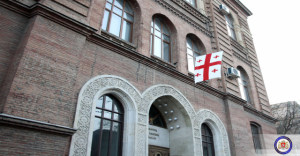34th Round of Geneva International Talks Held
The 34th round of the Geneva International Discussions was held on December 9th. The parties discussed the issues of security and stability in the occupied regions of Abkhazia and Tskhinvali as well as the safe and dignified return of IDPs and refugees to the places of their origin.
The EU, UN and OSCE co-chaired the discussions attended by participants from Georgia, the Russian Federation and the United States.
The Georgian Foreign Ministry (MFA) has stated the Head of the Provisional Administration of the former South Ossetian Autonomous District and the Chairman of the Government of the Autonomous Republic of Abkhazia as well as representatives of the Sokhumi and Tskhinvali occupation regimes took part in the discussions.
According to the MFA, after the 6-hours long session, while reviewing return of internally displaced persons and refugees, representatives of Sokhumi and Tskhinvali occupation regimes, and later the participants from the Russian Federation walked out of the talks. “As a result, according to the established practice, the co-chairs had to stop the discussions.”
The participants from Georgia reviewed the security situation in the occupied regions. In particular, emphasis was placed on the results of implementation of the so-called "treaties" signed by Russia with Sokhumi and Tskhinvali, as well as concerns over the militarization of Abkhazia and Tskhinvali regions, increasing the number of illegal military drills and violations by the Russian Federations of the airspace controlled by the central Government of Georgia. The Georgian delegation focused on the statement by the so-called “Abkhazian Defense Minister”, that the united group of military forces may be involved in military operations outside Abkhazia region, which once again illustrates the necessity to ensure the non-use of force and the international security arrangements in the occupied territories.
The MFA stated that the Georgian participants thoroughly discussed restrictions on education in native language in the occupied territories, in particular the Gali district, and demanded they ensure the possibility to receive education in Georgian language. “During the discussion of the issue, Georgian participants and representatives of international organizations underscored the need for international monitoring on the ground, in order to properly assess how the right to receive education in their mother tongue is protected. Discussion was held on the restrictions on the free movement for the local population and property rights violations, and in this context it was noted that discrimination on ethnic grounds is totally unacceptable.”












